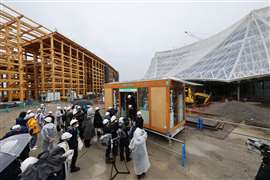Japan’s construction skills shortage threatens to overshadow Expo 2025
31 May 2024
Japan’s Expo 2025 is expected to welcome 28.2 million visitors between April and October next year at a 155 hectare site inside a huge latticed wooden ring. But construction work on the megaproject is being overshadowed by the country’s acute labour shortage. Lucy Barnard reports.
On an artificial island in Osaka Bay dozens of tracked crawler cranes are slowly moving around a 675-meter diameter latticed ring set to become one of the largest wooden buildings in the world.
Less than a year before Japan’s long-awaited Expo 2025 and the site for next year’s World’s Fair, Osaka’s reclaimed Yumeshima (dream island) is a hive of activity.
“All efforts are being deployed to make Expo 2025 Osaka Kansai a transformational and truly innovative event showcasing the potential future for people and the planet,” Bureau International des Expositions secretary general Dimitri Kerkentzes said during a visit to the Expo site in April 2024.
 Construction work continues at Japan’s Expo 2025 venue at Yumeshima, Osaka in April 2024, a year before the show is due to open. Photo: Reuters/ The Yomiuri Shimbin.
Construction work continues at Japan’s Expo 2025 venue at Yumeshima, Osaka in April 2024, a year before the show is due to open. Photo: Reuters/ The Yomiuri Shimbin.
The imposing ring structure, which is currently more than 70% complete and is being built using traditional techniques requiring no nails and based on traditional Japanese temple structures, will be topped by a 20m sloping canopy, and has a circumference of 2 kilometres.
But even as the 161 countries and territories prepare to show off their trade opportunities and cultural attractions at specially designed pavilions within the giant circle, the issues of acute labour shortages in Japan’s construction industry are threatening to overshadow the event.
Although many advanced economies are struggling to cope with a shortage of skilled construction workers, Japan’s problems are probably some of the worst in the world.
Why is Japan’s construction skills shortage so bad?
According to a labour force survey by Japan’s International Affairs and Communications Ministry, the number of people working in the country’s construction industry has fallen by nearly 20% over the last decade, from around 6.03 million in 2013 to just 4.83 million last year. And it found that 36% of the workforce was aged 55 or older.
The industry is struggling to attract young people who are often put off by perceptions of low status and pay, hard physical working conditions and a macho culture. This is exacerbated by the country’s declining birthrate, aging population and new rules which are coming into effect aimed at curbing a work culture of excessive hours.
Added to that this year is legislation restricting the amount of overtime which construction workers can take on to 45 hours per month or 360 hours per year. In cases where both construction workers and employers agree to an extension due to ‘special circumstances,’ the rules state that the limit can be extended to 720 hours a year.
 An artist’s impression of the Expo 2025 site. Image: Expo 2025
An artist’s impression of the Expo 2025 site. Image: Expo 2025
The move is part of a package of work style reforms passed by the Japanese government in 2019 to address a culture of long working hours.
In Japan, a country famed for its intense work culture defined by arduously long hours, the problem of ‘karoshi’ a word invented in the 1970s to describe workers literally working themselves to death through long hours and excessive occupational stress.
In 2019, concerns about an epidemic of untimely deaths of workers succumbing to strokes, heart attacks or taking their own lives due to ‘karoshi culture’ prompted the Japanese government to pass a work-style reform package amending eight labour laws and capping the amount of overtime employees could be required to perform.
For industries suffering from the most chronic labour shortages such as construction, the government agreed a five-year grace period, meaning that the overtime cap for the industry came into effect in April 2024.
The 2024 problem
The ensuing additional labour shortages caused by the new restrictions have been dubbed by the Japanese press “the 2024 problem” and have already caused a number of construction delays including a two-year delay for Tokyo’s Edogawa Ward government’s new office building.
In February, the Japan Association for the 2025 World Expo, which is organising the Expo moved back its target date for the completion of pavilions to be self-built by overseas participants to October from July amid delays in construction work due to a lack of workers.
 A mobile convenience store is set up at the Expo 2025 venue to provide snacks and drinks for construction workers while moving around the Expo site. Photo: Reuters: The Yomiuri Shimbun
A mobile convenience store is set up at the Expo 2025 venue to provide snacks and drinks for construction workers while moving around the Expo site. Photo: Reuters: The Yomiuri Shimbun
The association said that it had come up with a new timeline for the 50 or so ‘type A’ pavilions following discussions with overseas participants and contractors. By mid-April 2024 construction work had only started on 14 of these country pavilions, while 36 had selected construction firms.
Yet for the Expo organiser, which plans to open the show on 13 April next year amid a grand opening ceremony, the prospect of further construction delays loom as a very real and growing concern.
Last year, the organisation took the unusual step of sending a request to the Japanese government asking that it exempt Expo-related construction from the overtime cap.
The request in turn drew the ire of The Japan Construction Industry Employees Union Council (Nikken Council), which consists of labour unions from 35 general contractors. It argues that for a government-affiliated body to directly request an exemption from the law is morally wrong, and that the request contradicts the Expo’s theme of ‘designing future society for our lives.”
“Although we hope for the success of this event, we do not want to force the workers to overwork,” said Shusaku Kinami, chairman of “We want to build an industry where everyone can work forever and of which everyone can be proud. We will continue to work hard to improve the working environment in order to protect the rights and mental and physical health of our employees.”
Back on Yumeshima island, progress on the central pavilions continues. Organisers are hoping that innovations on site including Japan’s first mobile convenience store, which opened in May, will help to attract workers. The pavillions showcase projects based around the Expo’s sub-themes Saving Lives, Empowering Lives and Connecting Lives. Those are virtues Japan’s construction workers and their bosses must aspire to.
CONNECT WITH THE TEAM





